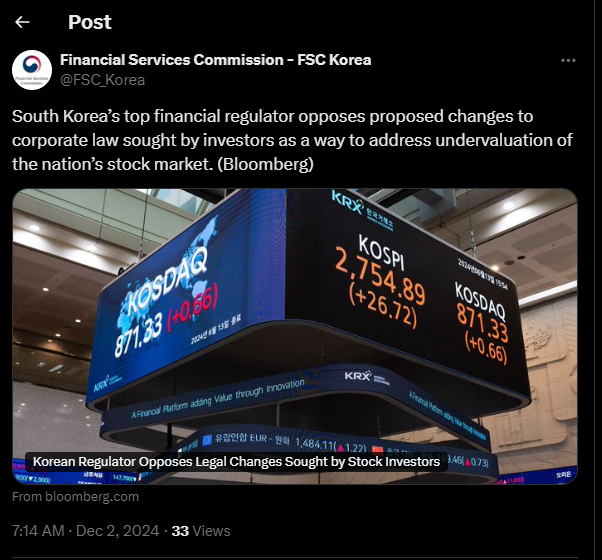South Korea’s Financial Services Commission (FSC) has refuted reports suggesting the agency plans to unveil a roadmap for corporate crypto accounts by the end of 2024. This clarification comes amid rising speculation over the potential expansion of institutional participation in the nation’s crypto market.
In an official statement, the FSC dismissed the rumors, asserting, “The issue of corporate real-name accounts for virtual assets is set to undergo further discussion, and specific measures have not yet been finalized. Therefore, please exercise caution in reporting.”
The FSC’s response follows an article published by Korea Economic Daily, which claimed that the commission had devised a phased plan to permit corporate crypto trading accounts.
According to the report, the alleged roadmap proposed a gradual rollout, beginning with universities and local governments in 2025 and eventually extending to corporations and financial institutions.
Current restrictions on corporate crypto accounts
Under South Korea’s existing regulations, corporations face considerable hurdles in engaging with the crypto market. A “de facto” ban prohibits them from trading on exchanges that offer fiat-to-crypto services, effectively sidelining corporate participation.
To transact in crypto, South Korean investors, primarily retail must use real-name accounts at banks partnered with licensed exchanges.
However, these banks generally prohibit corporations from opening such accounts, citing Anti-Money Laundering (AML) guidelines. Only five exchanges in South Korea have established partnerships with banks to facilitate this process.
The FSC’s cautious approach reflects broader challenges in regulating South Korea’s crypto market. While the Virtual Assets Protection Act, implemented in July, introduced measures to enhance risk management and accountability for exchanges, gaps remain in addressing corporate participation and infrastructure development.
Institutional participation under review
Despite denying the existence of a finalized roadmap, the FSC has acknowledged ongoing discussions regarding institutional access to the crypto market. On November 6, the FSC’s recently established crypto committee held its inaugural meeting to examine the possibility of easing restrictions on institutional crypto participation.
Industry insiders have noted that institutional involvement could diversify the market’s participant base and align South Korea with international trends in cryptocurrency adoption.
South Korea’s crypto market has consistently demonstrated its scale and impact. This week, during a brief political crisis, President Yoon Suk Yeol declared martial law, an order quickly overturned by the National Assembly. The nation saw a staggering $35 billion in 24-hour crypto trading volume.
Before the martial law order announcement, retail crypto trading volumes in South Korea had surged to $18 billion, surpassing the nation’s stock market by 22%. According to a December 2 report from 10x Research, these trading levels marked the second-highest of 2024, driven by heightened activity in “high momentum” altcoins.
Debate over corporate crypto accounts
The topic of corporate crypto accounts has sparked a heated debate among regulators, financial institutions, and market participants. Supporters argue that granting corporations access to crypto accounts could enhance market transparency, foster innovation, and attract institutional capital.
Institutions like Seoul National University have expressed interest in monetizing donated cryptocurrencies. The university reportedly holds nearly 100 billion won, which is approximately $75 million, in crypto assets donated by game company WeMade in 2022. However, regulatory barriers have prevented these funds from being converted into usable capital.
Critics, on the other hand, caution against potential risks, including money laundering, market volatility, and capital flight. Some analysts have voiced concerns that allowing corporate crypto accounts could exacerbate financial instability, particularly amid fluctuating domestic stock markets.
Land a High-Paying Web3 Job in 90 Days: The Ultimate Roadmap





